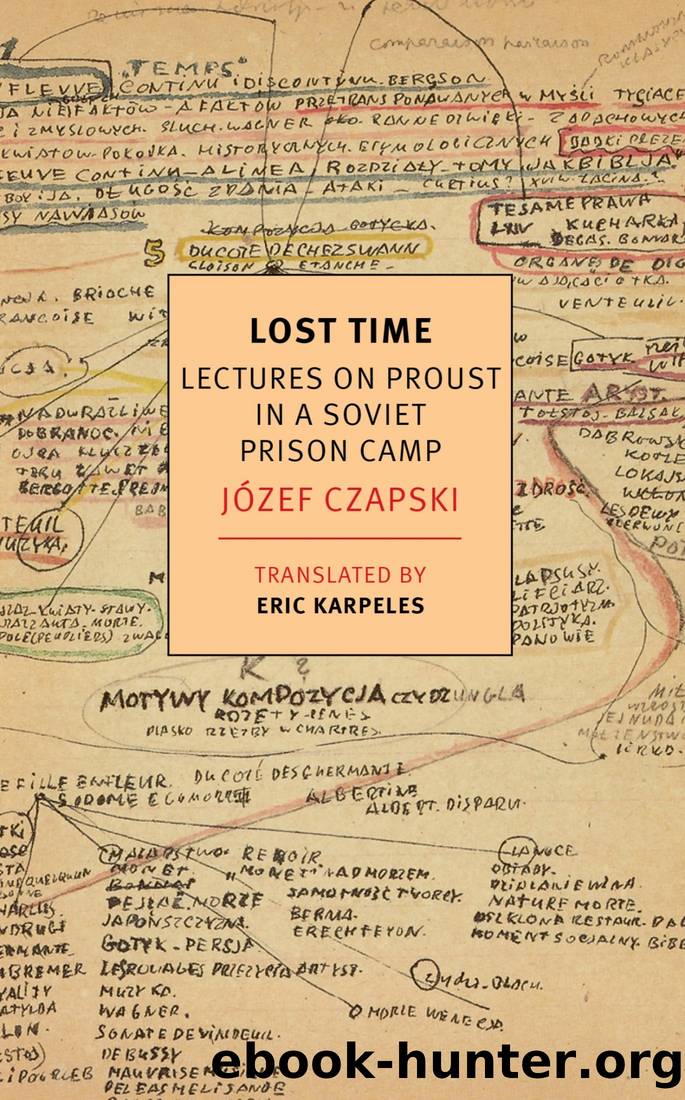Lost Time: Lectures on Proust in a Soviet Prison Camp by Jozef Czapski

Author:Jozef Czapski
Language: eng
Format: azw3
Tags: Speeches, Literary Collections, Subjects & Themes, French, Literary Criticism, Historical Events, European
ISBN: 9781681372587
Publisher: New York Review Books
Published: 2018-11-06T00:00:00+00:00
*Bergson was married to Proustâs cousin.
â In the typescripts, these two words appear as senza vigore. See âFernandezâ in the glossary.
3
IâVE ALREADY mentioned that only the first volumes of à la recherche, those that make up Du côté de chez Swann, were published before the war. They were the only volumes untouched by the evolution and changes in composition produced by Proustâs labor during the long war years. It is also the most precise and sharply focused part of the novel. Du côté de chez Swann already contains the first variations on all the motifs that make up the fabric of the volumes that follow. The ensuing volumes, which contain all the new material brought forth during the war, the new impressions and considerations, the huge expansion and essential reworking, were, nevertheless, only a further development of what had already been set into motion in Du côté de chez Swann. Letâs have a look at the basic themes: provincial France and the reclusive life of his retired old aunts; an ancient gothic church; descriptions of the countryside that have become classics in world literature; and Françoise, the old servant whom we meet in all the volumes, who, in the cast of characters of à la recherche, represents the rustic, working-class element. These are the first themes. Next comes childhood and the dramas of childhood: filial love and maternal love. The relationships between the hero and his mother and his grandmother become principal themes. The young boyâs visits to church each Sundayâthe stained glass windows showing members of the Guermantes dynasty as knights at the time of the Crusades, and the contemplation of the current Duchesse de Guermantes in flesh and bloodâspark his passionate interest in the Faubourg Saint-Germain, a subject he continues to study and analyze throughout all the volumes to come. We meet Swann in the first section, and almost the whole of the second section is filled with the love story of Swann and Odette, a young woman of the demimonde. This Odette, the personification of a woman who lives solely to be loved by men, unleashes mad passion, much suffering, and insane jealousy in Swann (a theme Proust studies very thoroughly and to which he devotes hundreds of pages in Du côté de chez Swann and also later in Albertine* and Albertine disparue). Thanks to Swann we gain access to the world of the wealthy Parisian bourgeoisie, in the salon of Madame Verdurin, a model of bourgeois wealth, a social climber, and a snob.
The heroâs childhood, the shocks and wounds that determine the course of his life, and the development of his moral and physical being are the central themes of Du côté de chez Swann. In speaking of it, Iâd like to touch lightly on a seminal episode in the later life of the author. The child, who goes on to become a young man, who grows into the mature man that Proust calls âI,â spends his summers with his parents in a small provincial village. The
Download
This site does not store any files on its server. We only index and link to content provided by other sites. Please contact the content providers to delete copyright contents if any and email us, we'll remove relevant links or contents immediately.
The Power of Myth by Joseph Campbell & Bill Moyers(1068)
A Social History of the Media by Peter Burke & Peter Burke(988)
Half Moon Bay by Jonathan Kellerman & Jesse Kellerman(987)
Inseparable by Emma Donoghue(983)
The Nets of Modernism: Henry James, Virginia Woolf, James Joyce, and Sigmund Freud by Maud Ellmann(913)
The Spike by Mark Humphries;(812)
The Complete Correspondence 1928-1940 by Theodor W. Adorno & Walter Benjamin(789)
A Theory of Narrative Drawing by Simon Grennan(783)
Culture by Terry Eagleton(776)
Ideology by Eagleton Terry;(743)
World Philology by(719)
Farnsworth's Classical English Rhetoric by Ward Farnsworth(715)
Game of Thrones and Philosophy by William Irwin(712)
Bodies from the Library 3 by Tony Medawar(709)
High Albania by M. Edith Durham(705)
Adam Smith by Jonathan Conlin(695)
A Reader’s Companion to J. D. Salinger’s The Catcher in the Rye by Peter Beidler(689)
Monkey King by Wu Cheng'en(654)
Comic Genius: Portraits of Funny People by(652)
